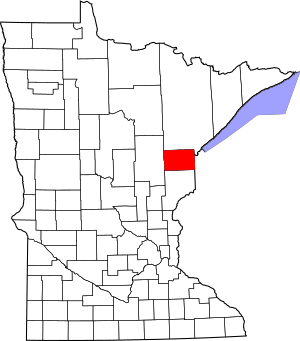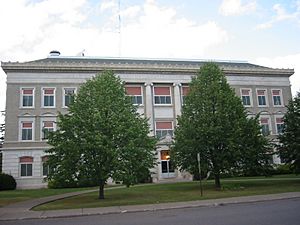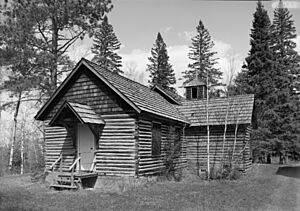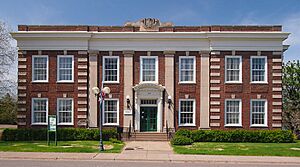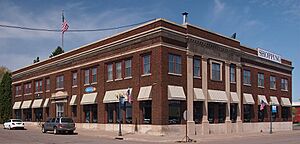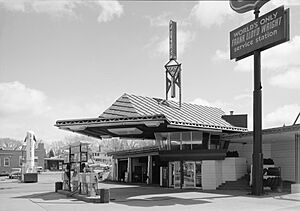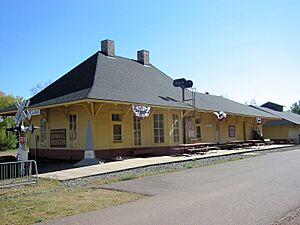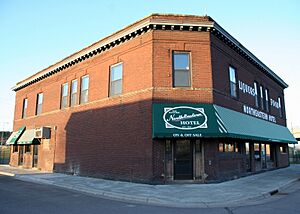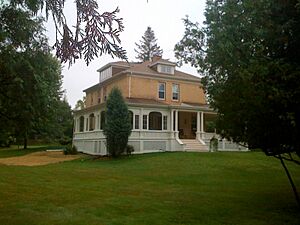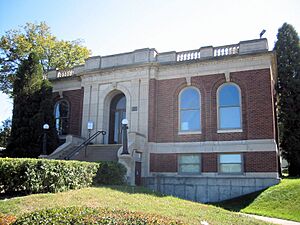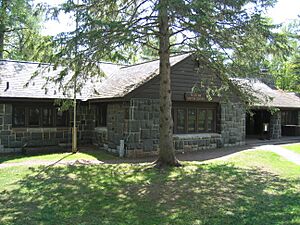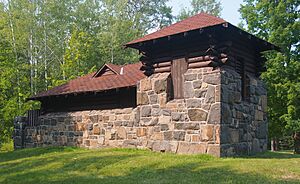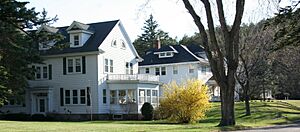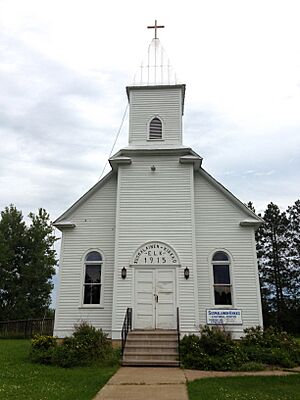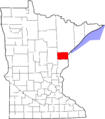National Register of Historic Places listings in Carlton County, Minnesota facts for kids
Carlton County, Minnesota, is home to many amazing places that are important to history. These special spots are listed on the National Register of Historic Places. This list helps protect buildings, sites, and objects that have played a big role in the past of the United States.
There are 15 places in Carlton County that are currently on this important list. There was also one other site that used to be listed but has since been removed. Let's explore some of these cool historic places!
Contents
Historic Buildings in Carlton County
Many buildings in Carlton County tell stories of how people lived and worked long ago. These structures often show unique designs or were built for special purposes.
Carlton County Courthouse
The Carlton County Courthouse is a very important building in the city of Carlton. It was built between 1922 and 1924. This courthouse has been the main place for local government for a long time. It was designed by a famous architect from Duluth named Clyde Kelly.
Church of Sts. Joseph and Mary-Catholic
Near Sawyer, you can find the Church of Sts. Joseph and Mary-Catholic. This church was first built in 1884 and later expanded in the 1920s. It's one of the oldest Catholic churches in Minnesota that was built by an Ojibwe community. It's also one of the few historic buildings in Carlton County that was around before the big 1918 Cloquet Fire.
Cloquet City Hall
The Cloquet City Hall was built in 1920. It's located in Cloquet. This building became a symbol of hope and rebuilding after the terrible 1918 Cloquet Fire. That fire destroyed most of the town. The City Hall was a key part of helping the community get back on its feet.
Cloquet-Northern Office Building
Also in Cloquet, the Cloquet-Northern Office Building was built in 1919. It was the biggest office building constructed after the 1918 fire. Many important businesses in the lumber town had their offices here. It shows how quickly Cloquet grew again after the fire.
R. W. Lindholm Service Station
The R. W. Lindholm Service Station in Cloquet is very special. It's the only gas station in the world designed by the famous architect Frank Lloyd Wright! It was built in 1958 and even influenced how other gas stations, like those for Phillips 66, were designed later on.
Minneapolis, St. Paul and Sault Ste. Marie Depot
In Moose Lake, the Minneapolis, St. Paul and Sault Ste. Marie Depot is a historic railway station from 1907. This station was a busy spot for people traveling and for shipping grain and iron ore. After the 1918 Cloquet Fire, it even became a temporary shelter for people who lost their homes. Today, it's a local history museum!
Northeastern Hotel
The Northeastern Hotel in Cloquet was built in 1904. It's on a river island and was once part of a lively area with many saloons during the lumber boom. After the 1918 Cloquet Fire, this hotel was used as a temporary hospital and even a post office, showing its importance to the community during a crisis.
Henry C. Oldenburg House
The Henry C. Oldenburg House in Carlton was built in 1894. It belonged to Henry C. Oldenburg, who was a politician and lawyer. He was a very important person in the early development of Carlton County and also helped start the conservation movement to protect nature.
Shaw Memorial Library
The Shaw Memorial Library in Cloquet was built in 1920. For many years, it was the only public library in Carlton County. It was also designed by the same architects, Kelly & Shefchik, who designed the Carlton County Courthouse. This library was another important public building built after the 1918 Cloquet Fire. Today, it houses the Carlton County Historical Society.
Historic Districts and Parks
Some historic listings aren't just single buildings, but entire areas or parks that have special historical meaning.
Grand Portage of the St. Louis River
The Grand Portage of the St. Louis River is located in Jay Cooke State Park, near Duluth. This was a very important route for Native Americans and fur traders long ago. It was a 7-mile (11 km) path that connected the Great Lakes to the Mississippi River. It helped people travel and trade across the region.
Jay Cooke State Park Historic Districts
Jay Cooke State Park has several historic districts that are recognized for their special history. These areas show the work of federal programs from the New Deal era, like the Civilian Conservation Corps (CCC) and the Works Progress Administration (WPA). These programs helped people find jobs during the Great Depression.
- Jay Cooke State Park CCC/Rustic Style Historic District: This district includes an amazing suspension bridge built in 1934 and an inn built between 1940 and 1942. These structures are great examples of the "National Park Service rustic architecture" style, which uses natural materials to blend with the environment.
- Jay Cooke State Park CCC/WPA/Rustic Style Picnic Grounds: This area has three park facilities built between 1934 and 1936. They also show the rustic style and the important work done by the CCC and WPA.
- Jay Cooke State Park CCC/WPA/Rustic Style Service Yard: This district includes two park buildings constructed between 1934 and 1935. They are another example of the New Deal programs helping to develop this major Minnesota state park.
Park Place Historic District
The Park Place Historic District in Cloquet includes four large houses built in 1919. These homes were built by the Weyerhaeuser company for its top executives. This area became known as the most fancy and important neighborhood in Cloquet.
Former Historic Listings
Sometimes, a place might be removed from the National Register of Historic Places. This usually happens if the building is moved or changed too much.
Kalevala Finnish Evangelical National Lutheran Church
The Kalevala Finnish Evangelical National Lutheran Church was a wooden church built in 1915 in Kalevala Township. It was listed on the National Register but was removed in 2006 because it was moved from its original location in 2003.
Images for kids


